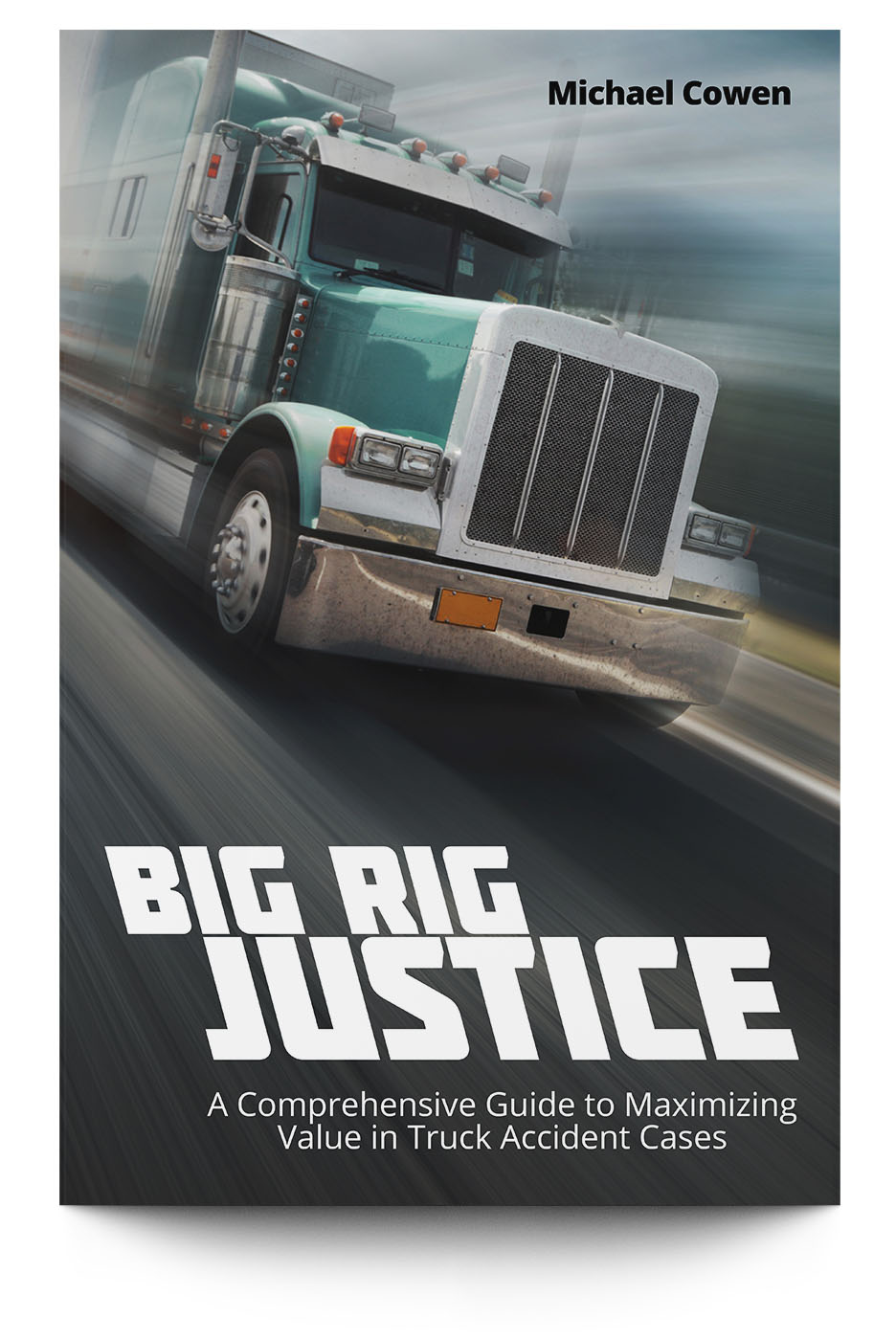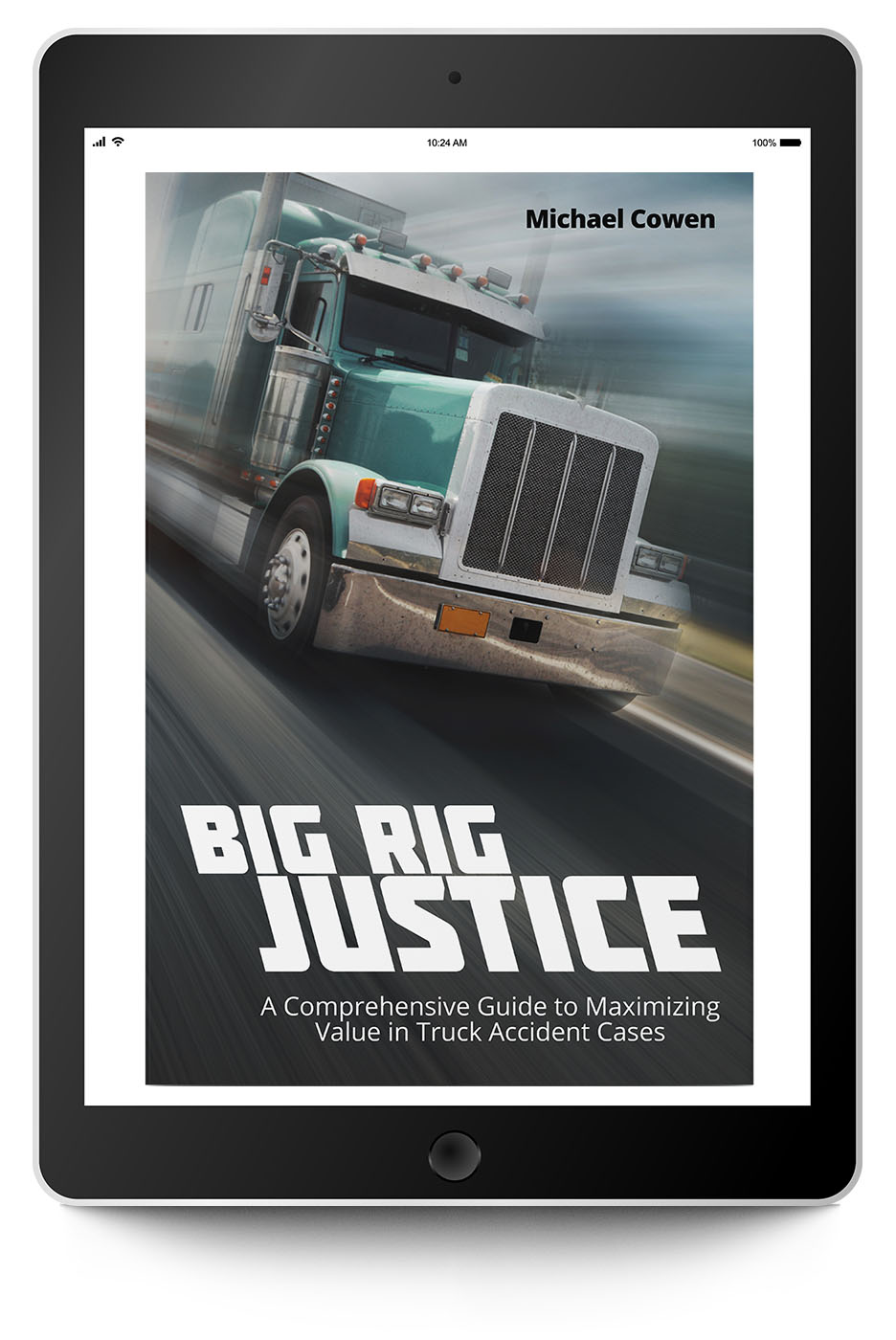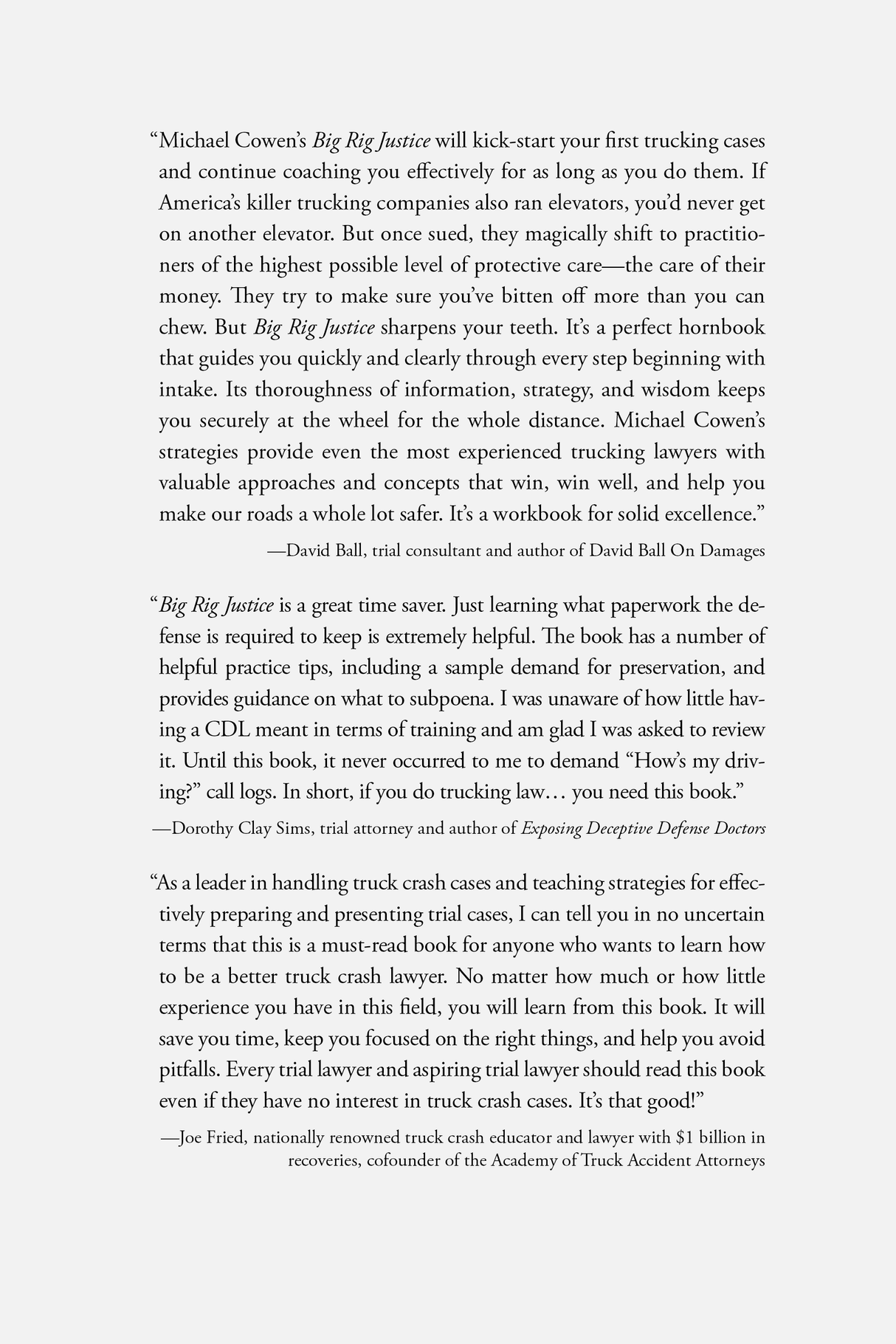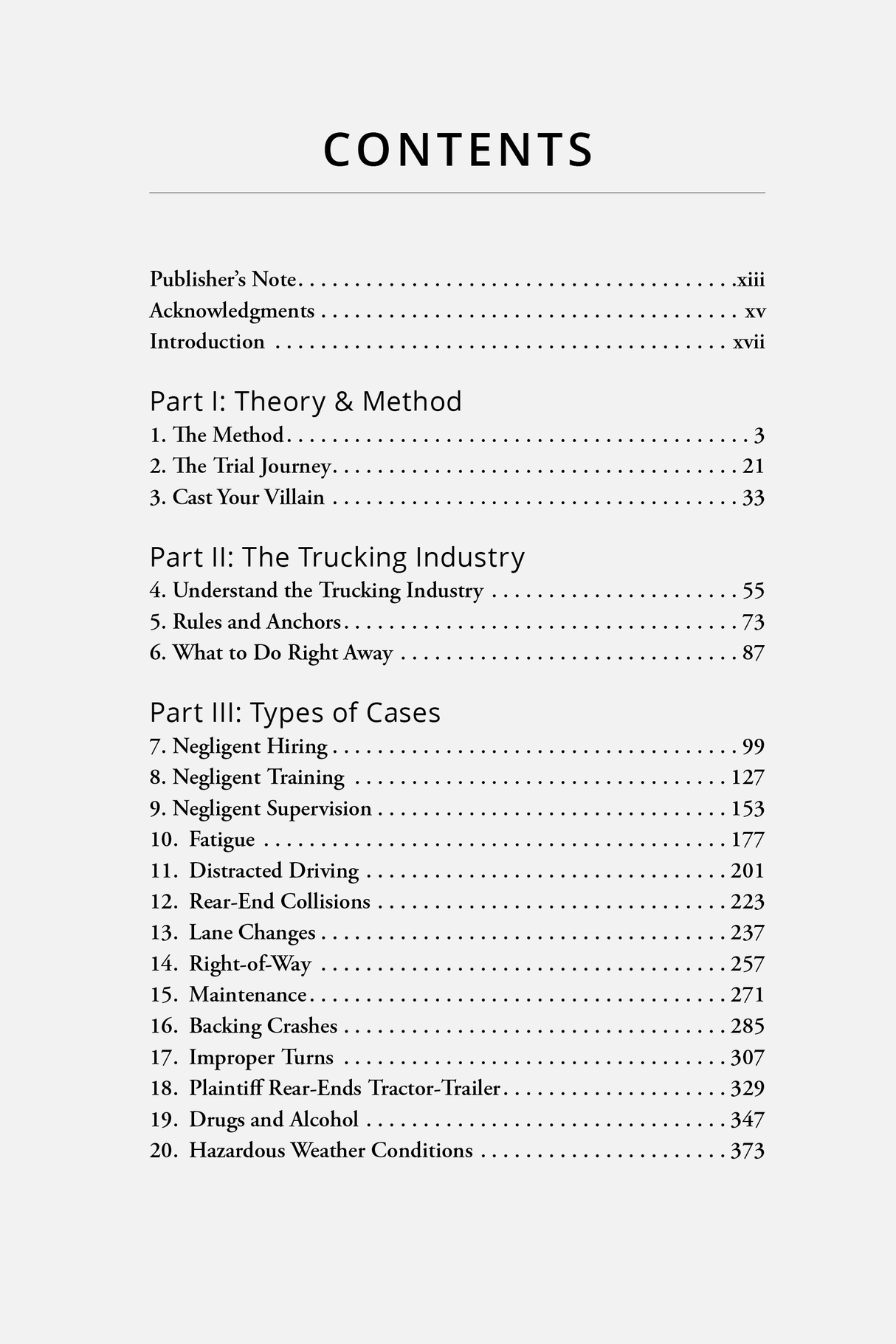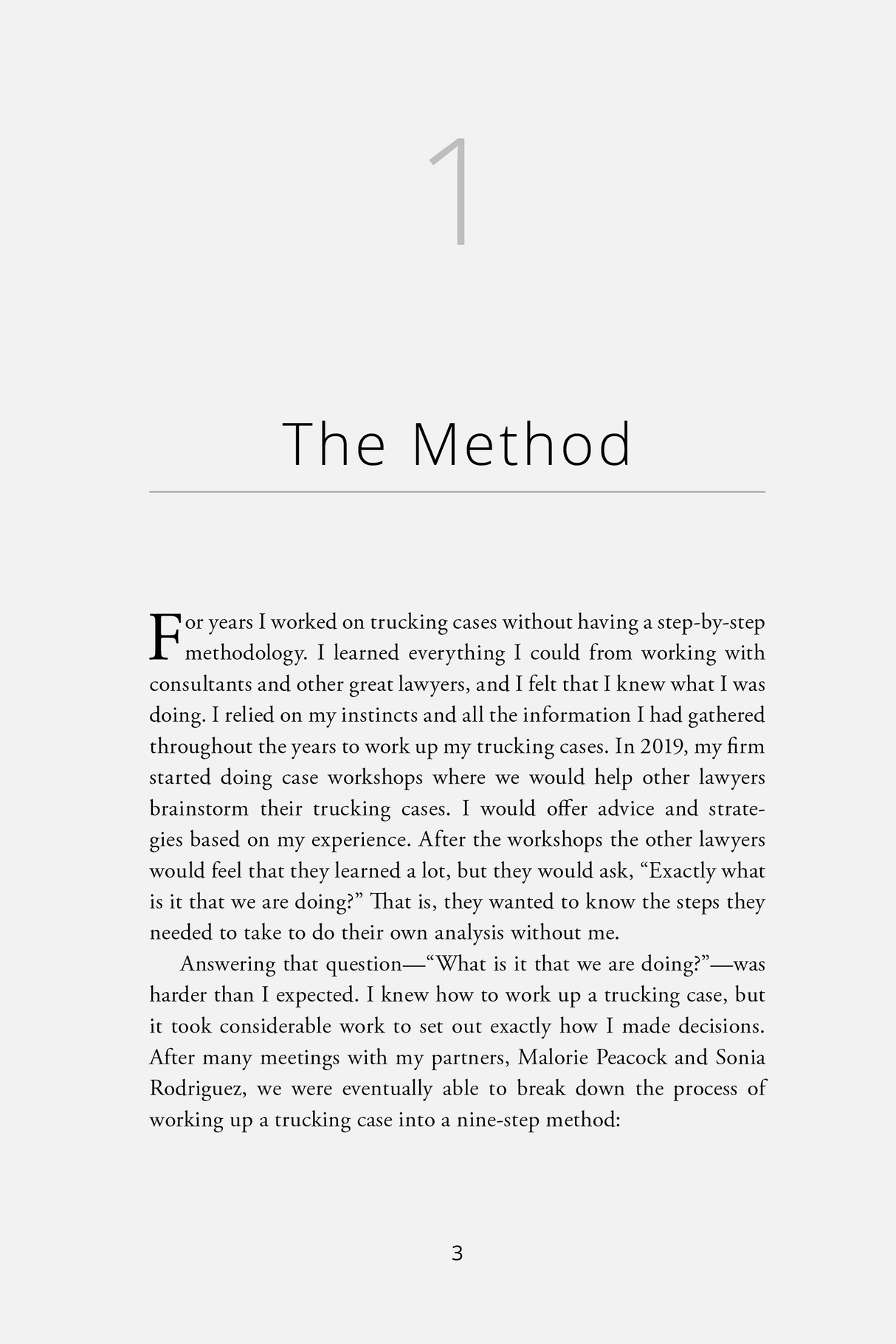Description
Description
A Framework for Trying Your Own Cases
Trial attorney Michael Cowen has handled over a thousand commercial trucking or company-owned vehicle cases. Many have resulted in six-, seven-, and even eight-figure settlements and verdicts. He’s spent the last several decades learning and discovering new and better ways to hold companies accountable for their bad conduct. Starting in 2019, Cowen began to hold case workshops to help other lawyers strengthen their trucking cases–offering advice and strategies based on his past experience. Across the workshops, one common question kept cropping up: “Exactly what is it that we are doing?” Realizing that the lawyers he was helping were looking for a series of steps they could take on their own, he began to draft a framework to empower them to do their own analysis and case development without him.
9 Steps for Developing and Winning Trucking Cases
Big Rig Justice: A Comprehensive Guide to Maximizing Value in Truck Accident Cases is Michael Cowen’s answer to any attorney seeking to learn how to handle trucking cases. In it, Cowen illustrates how to successfully apply his nine-step method for successfully working up, and winning, cases involving accidents with commercially-owned vehicles.
In part one, Cowen lays out his nine-step method:
- Initial triage
- Gather all available information
- Identify and analyze potential immediate causes
- Root cause analysis
- Draft jury instructions
- Find rules and anchors
- Formulate a discovery plan
- Continually re-evaluate the case
- Test the case
Cowen goes into the details of each step, mapping out each part and offering examples from past cases of his own. Michael also demonstrates how to develop your trial story as you complete each step and successfully frame the trucking company as the villain.
The Trucking Industry
In part two, Cowen provides an overview of the trucking industry. Cowen delves into the different regulations and rules–and the authorities that support those rules–that regulate the trucking industry to give you the background you need to try these cases. He also tells you how to find the regulations that govern motor carriers, and why you need to also know the realities of the industry so that you can understand why and when trucking companies are likely to make unsafe decisions that put people at risk. At the end of part two, Cowen discusses the evidence maintained by the government and trucking companies themselves, and how to get that evidence before it disappears.
The Different Types of Trucking Cases
Part three focuses on how to apply Cowen’s nine steps to different types of trucking cases. Cowen covers the most common crash scenarios, such as simple rear-end collisions, as well as more complex cases–such as when your client hits a parked tractor-trailer. This section also includes cases that deal with negligent training, bad hiring and retention practices, improper maintenance, fatigue, and distracted driving. In each type of case, Cowen offers examples of rules, safety regulations, government publications, driver handbooks, and materials from other trucking companies that you can use, as well as where to find them, and how to use documents and depositions to establish your case.
Unique Legal Issues
In the fourth and final part of Big Rig Justice, Cowen offers expert guidance on some of the legal issues that can be unique to trucking cases. Cowen draws from his decades of experience to offer insights on hiring and working with experts. He teaches strategies for resisting the defense’s attempts to hide evidence of bad conduct. And finally, Cowen details how you can make a case against brokers, shippers, and manufacturers–vital knowledge for claims in cases with catastrophic injuries caused by inadequately insured motor carriers.
Don’t Leave Money on the Table in Your Next Case
Trucking cases need to be handled differently from run-of-the-mill car crash cases. Cowen seeks to take what he’s learned from the decades of he’s cases tried, experts he’s hired, and consultants he’s worked with–from David Ball to Rodney Jew, Richard Jenson, and more–and pass that knowledge on to the next trial lawyers who will continue the work of holding companies accountable for their misconduct.
As Cowen puts it, “Your approach to a trucking case can have a dramatic effect on the outcome. Take two truck crash cases with identical facts and identical damages. One settles for hundreds of thousands of dollars; the other settles for millions. What is the difference?” In Big Rig Justice, Michael Cowen works to help you find the answer.
Your eBooks are now accessible from your Trial Guides account! Click here for step by step instructions.
Do you want the eBook and print book? After you complete your purchase of the print book you will receive a coupon code via email to purchase the eBook for $20.
Author
Author
Details
Details
Paperback: 600 pages; 1st Edition (2023); ISBN: 978-1-951962-56-2
Publisher: Trial Guides LLC
Table of Contents
Table of Contents
Publisher’s Note
Foreword
Acknowledgments
Introduction
Part One: Theory and Method
1. The Method
2. The Trial Journey
3. Cast Your Villain
Part Two: The Trucking Industry
4. Understand the Trucking Industry
5. Rules and Anchors
6. What to Do Right Away
Part Three: Types of Cases
7. Negligent Hiring
8. Negligent Training
9. Negligent Supervision
10. Fatigue
11. Distracted Driving
12. Rear-End Collisions
13. Lane Changes
14. Right-of-Way
15. Maintenance
16. Backing Crashes
17. Improper Turns
18. Plaintiff Rear-Ends Tractor-Trailer
19. Drugs and Alcohol
20. Hazardous Weather Conditions
Part Four: Legal Issues
21. Other Defendants
22. Overcoming Stipulations
23. Experts
Conclusion
About the Author
What Legal Leaders Are Saying
— Joe Fried, nationally renowned truck crash educator and lawyer with $1 billion in recoveries, cofounder of the Academy of Truck Accident AttorneysAs a leader in handling truck crash cases and teaching strategies for effectively preparing and presenting trial cases, I can tell you in no uncertain terms that this is a must-read book for anyone who wants to learn how to be a better truck crash lawyer. No matter how much or how little experience you have in this field, you will learn from this book. It will save you time, keep you focused on the right things, and help you avoid pitfalls. Every trial lawyer and aspiring trial lawyer should read this book even if they have no interest in truck crash cases. It’s that good!
— Dorothy Clay Sims, trial attorney and author of Exposing Deceptive Defense DoctorsBig Rig Justice is a great time saver. Just learning what paperwork the defense is required to keep is extremely helpful. The book has a number of helpful practice tips, including a sample demand for preservation, and provides guidance on what to subpoena. I was unaware of how little having a CDL meant in terms of training and am glad I was asked to review it. Until this book, it never occurred to me to demand “How’s my driving?” call logs. In short, if you do trucking law… you need this book.
— Randy Sorrels, past president of the State Bar of Texas, TEX-ABOTA Trial Lawyer of the Year and the ALM/Texas Lawyer Trial Lawyer of the Year in 2022, obtained the largest auto-pedestrian verdict ($352.7 million) for an injured worker in a contested case in US historyBig Rig Justice brings big-time education for lawyers who litigate trucking cases and who strive to employ the most up-to-date jury persuasion skills. Michael Cowen has long been recognized as a consummate student of our profession who both teaches and learns with the best. This book converts Michael’s wealth of knowledge into a well-written, easy-to-follow roadmap of intake, discovery, and the prosecution of truck crash cases for lawyers who represent victims. As an added benefit, he also provides meaningful advice and tips on effective jury presentation techniques that are applicable in any personal injury case. No matter where a lawyer is on the experience scale, this is a must-read book.
— Gregory S. Cusimano, recipient of the AAJ Lifetime Achievement Award and co-creator of the Jury Bias ModelMichael Cowen in Big Rig Justice lays it out there like it should be! Many lawyers wrongly think a trucking case doesn’t require special expertise. With the help provided by Michael in this book, you will learn how you can better serve your clients. He covers it all, pulling together the wisdom he has learned from his experience and shares with the reader what he has learned from others. Do yourself and your clients a favor—buy this book!
— Lisa Blue, past president of the AAJ and National Trial LawyersThis is the go-to book for anyone who does trucking litigation. Whether you are a new or an experienced litigator, Cowen’s easy explanations on how to litigate a trucking case are clear and to the point. Cowen‘s thoughtful analysis covers every aspect that can arise in a trucking case. If you do trucking litigation, this book will become a staple in your legal library.
— Ken Levinson, coauthor of Litigating Major Automobile Injury and Death Cases and chair of the AAJ Trucking Litigation GroupTrucking cases can be some of the most complex and challenging legal battles to navigate, requiring a unique set of skills and expertise. In this comprehensive guide, experienced truck crash trial lawyer Michael Cowen shares insights and strategies for successfully handling trucking cases. His outstanding work guides you from investigating the collision scene to determining the actual cause of a crash to presenting your case to a jury. With real-world examples and practical tips, this book is an essential resource for any attorney seeking to effectively represent clients involved in trucking crashes. If you handle trucking cases, you owe it to your clients to read and use this book as an integral part of your practice.
— John Sloan, past president of the Trial Lawyers College, has tried over 150 cases to a jury verdict, ABOTA member, and is on the board of regents of the Academy of Truck Accident AttorneysMichael is a fantastic teacher, an award-winning podcaster, and a consummate trial lawyer, and his book Big Rig Justice demonstrates his ability to put it all down in print. This book is definitely one of the best-written, organized, and practical books for those who practice in the area of commercial vehicle litigation ever! I predict that there will be a copy of Michael’s book on the shelves of every lawyer that handles or aspires to handle truck accident litigation. It really is that good. In the book, Michael shares the secrets and practical tips that he has learned over more than two decades of truck litigation work. The book is excellent for not only those newly engaged in trucking and commercial vehicle litigation but also for those of us that are getting a little long in the tooth. I highly recommend it.
— Marion Munley, past chair of the AAJ Trucking Litigation Group and the Women Trial Lawyers Caucus, past president of the Melvin M. Belli Society, and member of the American Board of Trial Advocates, the International Society of Barristers, and the Summit CouncilBig Rig Justice is a must-have for the library of every serious trucking law practitioner. Michael Cowen has put to writing a lifetime of study and learning—a work that will prove invaluable in the preparation and trial of any truck case.
— Morgan G. Adams, past chair of the AAJ Truck Litigation Group, recipient of the AAJ Lifetime Achievement Award, and member of the Multi-Million Dollar Advocates ForumMichael distills the school of hard knocks, old-school knowledge, and real-world experience and combines it with modern practice to create an exceptional aid to any trial lawyer and their team. Not only does he provide “how-to” examples he also explains the reasoning and ideas that created the processes and examples. The book will teach you and your staff how to think, act, and handle cases like a trucking lawyer with hundreds of cases under their belt. There are ideas useful for every experience level and from every trial school whether the Edge, the Trial Lawyers College, or something in between. Further, the ideas and processes are useful far beyond the trucking litigation world and will cause you to rethink how you approach every case in your office. I wish I had this book years ago, I am thrilled I have it now.
— Michael Leizerman, founding chair of the AAJ Trucking Litigation Group, cofounder of the Academy of Truck Accident Attorneys, and coauthor of Litigating Truck Accident CasesIn Big Rig Justice, Michael Cowen delivers a clear and accessible guide for navigating the complexities of truck crash cases and step-by-step guidance for crafting a compelling case. He discusses trucking law basics and delves beyond the fundamentals, providing readers with his unique insights and strategies for uncovering the villain in the trial story. By offering a roadmap for case analysis, this book gives lawyers the tools needed to succeed in truck cases. Don't miss your chance to learn from one of the best trucking lawyers in the country; add this must-read Trial Guides book to your collection.
— Jim S. Adler, director of the Texas Trial Lawyers AssociationOur brilliant friend Michael Cowen has done it again. Big Rig Justice is a primer for any attorney who represents clients horribly injured by 18-wheeler crashes. We all owe Michael a big thank you for sharing his in-depth experience and knowledge so unconditionally.
— Timothy Whiting, past chair of the Academy of Truck Accident Attorneys and board certified in truck accident law by the NBTAAs a lawyer only handling truck accident cases, I found Big Rig Justice to be an invaluable resource in helping me maximize the value of my trucking accident cases by settlement or by trial. Big Rig Justice provides a comprehensive overview of the legal and practical issues involved in litigating truck accident cases, from investigating the accident scene to the type of experts you need to retain and from key strategies to winning your trucking case. Whether you are handling just one truck accident case, or you have handled many, you will find Michael’s book to be helpful in winning your truck accident cases.
— David Ball, trial consultant and author of David Ball On DamagesMichael Cowen’s Big Rig Justice will kick-start your first trucking cases and continue coaching you effectively for as long as you do them. If America’s killer trucking companies also ran elevators, you’d never get on another elevator. But once sued, they magically shift to practitioners of the highest possible level of protective care—the care of their money. They try to make sure you’ve bitten off more than you can chew. But Big Rig Justice sharpens your teeth. It’s a perfect hornbook that guides you quickly and clearly through every step beginning with intake. Its thoroughness of information, strategy, and wisdom keeps you securely at the wheel for the whole distance. Michael Cowen’s strategies provide even the most experienced trucking lawyers with valuable approaches and concepts that win, win well, and help you make our roads a whole lot safer. It’s a workbook for solid excellence.
— Mark Kosieradzki, author of 30(b)(6):Deposing Corporations, Organizations & the GovernmentMichael provides us with the step-by-step methodology for building a trucking case, from initial triage, investigation, and document gathering through trial strategy. He shows us how to take a case about a collision and build it into a case about the corporate root cause systemic negligence that was the real cause of the tragedy. Big Rig Justice is the resource every lawyer handling, or aspiring to handle, a trucking case should have on the shelf.
— Sari de la Motte, trial consultant and author of From Hostage to Hero: Captivate the Jury by Setting Them FreeI've worked with thousands of trial attorneys over the years and can say without hesitation that Michael Cowen is one of the best. He has an unquenchable thirst for knowledge, and now he's taken that knowledge and placed it in your hands. Whether you've handled trucking cases for years or are just starting, reading Michael's book should be the next thing on your to-do list.
— John Romano, past president of the Florida Justice Association and Trial Lawyer Hall of Fame InducteeIf you are looking for a step-by-step guide to handling a trucking case from crash to verdict, look no further. Whether you are handling your first trucking case or your 100th, this book will help you achieve better results for your clients. Filled with practical tips and keen insight, it is a how-to manual covering every phase of a trucking case, from initial investigation all the way through trial. It’s the book I wish I had forty years ago, and it’s a must-read for every trial lawyer handling truck crash cases.
— Mark S. Mandell, member of the Inner Circle of AdvocatesMichael Cowan has produced a well-written treatise on how to select, investigate, prepare, and try trucking accident cases. The book offers many practical and creative ideas as to how to frame your case issues and proof. Michael’s advice to make the case more than about the crash pays homage to the truth that we need to frame our cases so they resonate with jurors. I enjoyed his use of the “5 Whys” method of root cause analysis. His description and use of anchors and his “how-to” advice are thoughtful and effective. I highly recommend this book to any lawyer who works with trucking accident cases.

